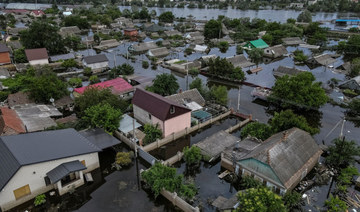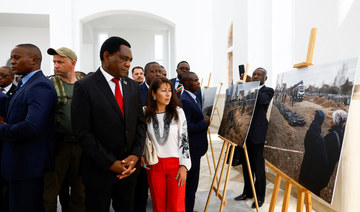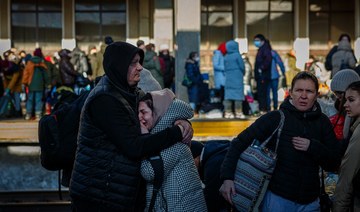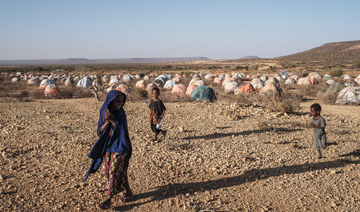KYIV: A high-level African delegation was preparing to meet with Russian President Vladimir Putin on Saturday, a day after its calls for talks between Moscow and Kyiv were rebuffed by Ukrainian leader Volodymyr Zelensky.
The diplomatic team had gone to Kyiv on Friday to voice the concerns of a continent that has suffered from the fallout of Russia’s invasion – in particular rising grain prices – with South African President Cyril Ramaphosa insisting “there should be peace through negotiations.”
But Zelensky ruled out that possibility during a joint press conference with the delegates, telling reporters: “I clearly said several times at our meeting that to allow any negotiations with Russia now that the occupier is on our land is to freeze the war, to freeze pain and suffering.”
Shortly after the African leaders’ arrival, air raid sirens sounded across the country as Russian missiles were detected, forcing the delegates to take shelter in the capital.
Zelensky said the strike on Kyiv during the delegation’s visit showed that Putin either did not control his army, or was “irrational.”
Ramaphosa, however, took the barrage as evidence that both sides needed to stop fighting.
“It is precisely that type of event that we saw today... that makes us call for de-escalation,” Ramaphosa said, quoting Nelson Mandela several times on the need for peace.
In a statement, Zelensky said he had called on the leaders to set out their views on how to stop the “crimes committed by Russia,” and how to work toward food security.
“But first of all, we must restore the full force of the UN Charter and stop this brutal Russian aggression and free our land,” he added.
The African delegation had gone first to Bucha, a town outside the capital that has become synonymous with alleged war crimes carried out by Moscow.
The group includes four presidents: Ramaphosa, Senegal’s Macky Sall, Zambia’s Hakainde Hichilema and Comoros’ Azali Assoumani, who also currently heads the African Union.
The leaders of Uganda, Egypt and Congo-Brazzaville pulled out of the visit at the last moment and sent representatives instead.
The meeting came as Ukraine announced gains in a new counteroffensive, but Putin claimed on Friday that Kyiv’s forces “stand no chance” in the sectors where fighting has intensified.
The African leaders were set to meet Putin in the northwestern Russian city of Saint Petersburg on Saturday.
“In our view it is important to listen very carefully to what both countries have to say, and tomorrow we are now going to listen to President Putin,” Ramaphosa said.
Speaking at an annual economic forum in Saint Petersburg on Friday, Putin displayed little appetite for peace talks, announcing the deployment of nuclear weapons in Belarus while also calling Zelensky a “disgrace to the Jewish people.”
Russia first announced plans to station tactical nuclear arms in its ally and neighbor in March, with Putin saying Friday that the “first nuclear warheads were delivered to the territory of Belarus.”
He said the weapons were meant as a deterrent to “those who are thinking of inflicting a strategic defeat on Russia.”
Putin also told forum attendees he had “a lot of Jewish friends” who had told him “that Zelensky is not Jewish, that he is a disgrace to the Jewish people.”
Despite Zelensky’s Jewish heritage, Moscow has justified its war with claims it needs to “de-Nazify” Ukraine.
Analysts, meanwhile, said the delegation’s mediating effort could hope to win some concessions from the Kremlin ahead of a Russia-Africa summit next month.
The African continent has been badly hit by rising grain and fertilizer prices as well as the wider impact on global trade since Russia invaded Ukraine last year.
“This conflict is also affecting African countries negatively, touching on the livelihoods of 1.2 or 1.3 billion people on the African continent,” Ramaphosa said.
African nations have been divided over their response to the war, with some siding with Ukraine and others remaining neutral or gravitating toward Moscow.
South Africa, for one, has drawn scrutiny for refusing to condemn the offensive launched by Moscow.
African leaders prepare to meet Vladimir Putin after Volodymyr Zelensky rules out talks
https://arab.news/572cj
African leaders prepare to meet Vladimir Putin after Volodymyr Zelensky rules out talks
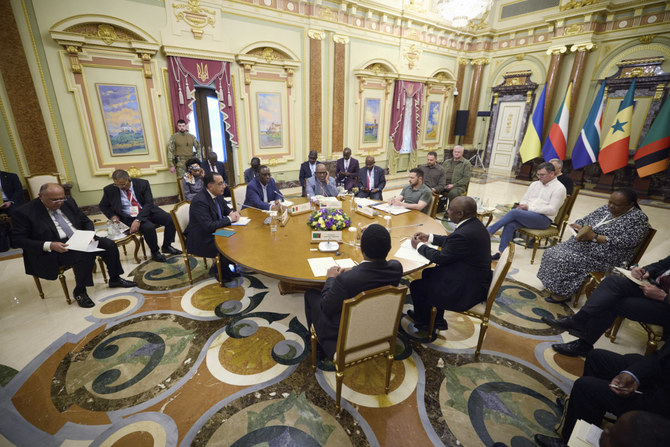
- African leaders set to meet Putin in the northwestern Russian city of Saint Petersburg on Saturday
- Delegation’s mediating effort could hope to win some concessions from the Kremlin ahead of a Russia-Africa summit next month
Haldiram’s: India’s beloved snack maker eyed by foreign investors Blackstone, UAE wealth fund

- Haldiram’s started in 1937 from “tiny shop” in Bikaner in desert state of Rajasthan
- Haldiram’s has almost a 13% share of India’s $6.2 billion savoury snacks market
From fried Indian snacks to local sweet delicacies, family-run Indian snack maker Haldiram’s has long been one of the country’s most popular food brands. Now, foreign investors like Blackstone and Abu Dhabi Investment Authority want a big bite of it.
Haldiram’s was last year also an acquisition target for India’s Tata Group, one of the country’s biggest conglomerates.
Here are some facts about the popular Indian brand:
* Haldiram’s started in 1937 from a “tiny shop” in Bikaner in the western desert state of Rajasthan. It later expanded to New Delhi in 1983.
* The company’s website says it has 1,000 distributors and its products are available in 7 million outlets. It also exports to many foreign countries including Japan, Russia, United Kingdom and Australia.
* One of its most popular snacks is “bhujia,” a crispy fried Indian snack made with flour, herbs and spices and sold for as little as 10 rupees (12 US cents) across mom-and-pop stores. Haldiram’s calls it “an irresistible Indian snack” which can “captivate your taste buds.”
* Haldiram’s started exporting products in 1993. The US was its first market, where it began with 15 savoury products, and later, in 2016, opened its first overseas factory in the UK.
* Beyond snacks, Haldiram’s also sells ready-to-eat and frozen foods such as Indian curries and rice items. It also runs more than 150 restaurants which sell street-style Indian food, as well as Chinese and western cuisine.
* Last year, during deal talks with Tata, Haldiram’s was seeking a $10 billion valuation. Reuters has previously reported Haldiram’s annual revenues are around $1.5 billion.
* Haldiram’s has almost a 13% share of India’s $6.2 billion savoury snacks market, Euromonitor International estimates.
($1 = 83.5200 Indian rupees)
Internally displaced people reached 76 million in 2023 – monitoring group

- Almost 90 percent of the total displacement was attributed to conflict and violence
- The group reported a total of 3.4 million movements within Gaza in the last quarter of 2023
GENEVA: Conflicts and natural disasters left a record nearly 76 million people displaced within their countries last year, with violence in Sudan, Congo and the Middle East driving two-thirds of new movement, a top migration monitoring group said Tuesday.
The Internal Displacement Monitoring Center report found that the number of internally displaced people, or IDPs, has jumped by 50 percent over the past five years and roughly doubled in the past decade. It doesn’t cover refugees — displaced people who fled to another country.
The report tracks two major sets of information. It counted 46.9 million physical movements of people in 2023 — sometimes more than once. In most of those cases, such as after natural disasters like floods, people eventually return home.
It also compiles the cumulative number of people who were living away from their homes in 2023, including those still displaced from previous years. Some 75.9 million people were living in internal displacement at the end of last year, the report said, with half of those in sub-Saharan African countries.
Almost 90 percent of the total displacement was attributed to conflict and violence, while some 10 percent stemmed from the impact of natural disasters.
The displacement of more than 9 million people in Sudan at the end of 2023 was a record for a single country since the center started tracking such figures 16 years ago.
That was an increase of nearly 6 million from the end of 2022. Sudan’s conflict erupted in April 2023 as soaring tensions between the leaders of the military and the rival Rapid Support Forces broke out into open fighting across the country.
The group reported a total of 3.4 million movements within Gaza in the last quarter of 2023 amid the Israeli military response to the Oct. 7 attacks in Israel. That means that many people moved more than once within the territory of some 2.2 million. At the end of the year, 1.7 million people were displaced in Gaza.
Group director Alexandra Bilak said the millions of people forced to flee in 2023 were the “tip of the iceberg,” on top of tens of millions displaced from earlier and continuing conflicts, violence and disasters.
The figures offer a different window into the impact of conflict, climate change and other factors on human movement. The UN refugee agency monitors displacement across borders but not within countries, while the UN migration agency tracks all movements of people, including for economic or lifestyle reasons.
Pakistan PM unveils broader plan to sell most state-owned firms

- Announcement comes amid talks on new IMF loan
- There can’t be any strategic commercial SOEs, says ex-minister
ISLAMABAD: Pakistan will privatise all state-owned enterprises, with the exception of strategic entities, Prime Minister Shehbaz Sharif said on Tuesday, broadening its initial plans to sell only loss-making state firms to shore up its shaky finances.
The announcement came after Sharif headed a review meeting of the privatization process of loss-making state enterprises (SOEs), according to a statement from his office, which discussed a roadmap for privatization from 2024 to 2029.
“All of the state-owned enterprises will be privatised whether they are in profit or in losses,” Sharif said, adding that offloading the SOEs will save taxpayers’ money.
The statement didn’t clarify which sectors would be deemed strategic and non-strategic.
The announcement came a day after an International Monetary Fund (IMF) mission opened talks in Islamabad for a new long-term Extended Fund Facility (EFF), following Pakistan’s completion of a $3 billion standby arrangement last month, which had averted a sovereign debt default last summer.
Privatization of loss-making SOEs has long been on the IMF’s list of recommendations for Pakistan, which is struggling with a high fiscal shortfall and a huge external financing gap. Foreign exchange reserves are hardly enough to meet up to a couple of months of controlled imports.
The IMF says SOEs in Pakistan hold sizable assets inn comparison with most Middle East countries, at 44 percent of GDP in 2019, yet their share of employment in the economy is relatively low. The Fund estimates almost half of the SOEs operated at a loss in 2019.
Patchy success so far
Past privatization drives have been patchy, mainly due to a lack of political will, market watchers say.
Any organization that is involved in purely commercial work can’t be strategic by its very nature, which means there can’t be any strategic commercial SOEs, former Privatization Minister Fawad Hasan Fawad told Reuters on Tuesday.
“So to me there are really no strategic SOEs,” he said.
“The sooner we get rid of them the better. But this isn’t the first time we have heard a PM say this and this may not be the last till these words are translated into a strategic action plan and implemented.”
Islamabad has for years been pumping billions of dollars into cash-bleeding SOEs to keep them afloat, including one of the largest loss-making enterprises
Pakistan International Airline, which is in its final phase of being sold off, with a deadline
later this week to seek expressions of interest from potential buyers.
The pre-qualification process for PIA’s selloff will be completed by end-May, the privatization ministry told Tuesday’s meeting, adding discussions were underway to sell the airline-owned Roosevelt Hotel in New York.
It also said a government-to-government transaction on First Women Bank Ltd. was being discussed with the United Arab Emirates, and added that power distribution companies had also been included in the privatization plan for 2024-2029.
“The loss-making SOEs should be privatised on a priority basis,” Sharif said.
Russian president Putin to make a state visit to China this week

- The Kremlin in a statement confirmed the trip and said Putin was going on Xi’s invitation
BEIJING: Russian President Vladimir Putin will make a two-day state visit to China this week, the Chinese Foreign Ministry said Tuesday.
Putin will meet Chinese leader Xi Jinping during his visit starting on Thurday, it said.
The Kremlin in a statement confirmed the trip and said Putin was going on Xi’s invitation. It said that this will be Putin’s first foreign trip since he was sworn in as president and began his fifth term in office.
The two continent-sized authoritarian states, increasingly in dispute with democracies and NATO, seek to gain influence in Africa, the Middle East and South America. China has backed Russia’s claim that President Vladimir Putin launched his assault on Ukraine in 2022 because of Western provocations, without producing any solid evidence.
Pro-Palestinian protesters cleared from Geneva university

- Geneva university officials had asked the protesters on Monday to vacate the premises and protest in a different manner.
About 20 officers entered the UniMail building around 0300 GMT, a journalist from the Keystone-ATS news agency said.
“Most of the students were sleeping. After being gathered they were led to the underground parking garage,” Julie Zaugg, a journalist with LemanbleuTV channel, said on X.
She said they shouted pro-Palestinian slogans before being handcuffed and taken away in vans.
Geneva university officials had asked the protesters on Monday to vacate the premises and protest in a different manner.
Students demonstrations have gathered pace across Western Europe in recent weeks with protesters demanding an end to the Gaza bloodshed and to cut ties with Israel, taking their cue from demonstrations that have swept US campuses.
There have been similar protests in other Swiss universities and polytechnic schools including Lausanne, Berne, Basel and Zurich.
The bloodiest ever Gaza war began with Hamas’s October 7 attack on Israel, which resulted in the deaths of more than 1,170 people, mostly civilians, according to an AFP tally based on Israeli official figures.
Militants also seized hostages, of whom Israel estimates 128 remain in Gaza, including 36 the military says are dead.
Israel’s bombardment and offensive in Gaza have killed at least 35,091 people, mostly women and children, according to the health ministry in the Hamas-run territory.




